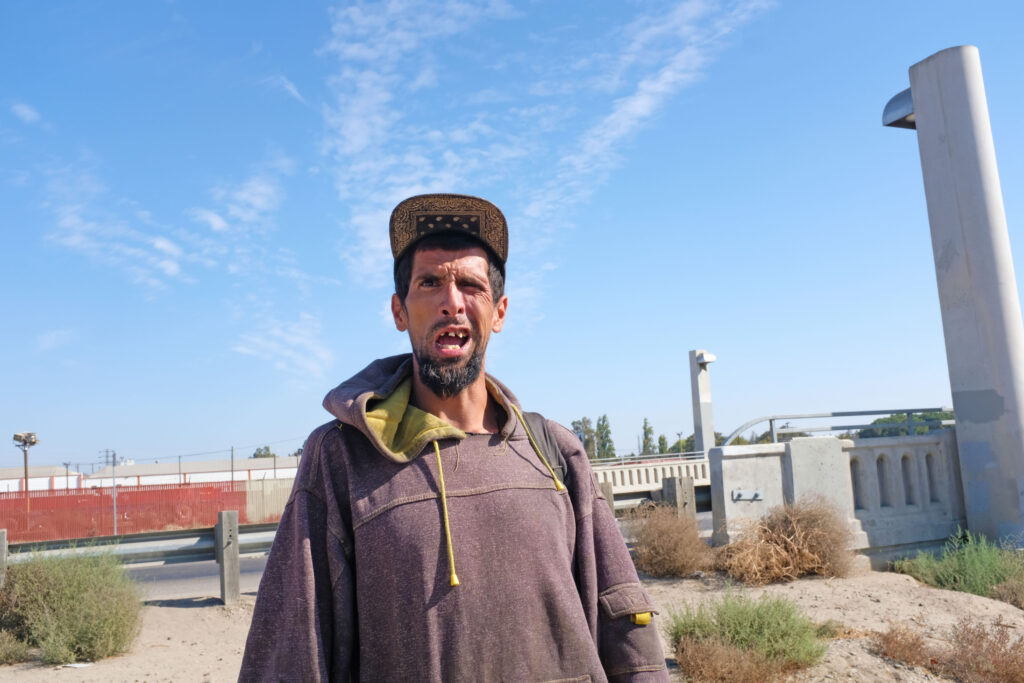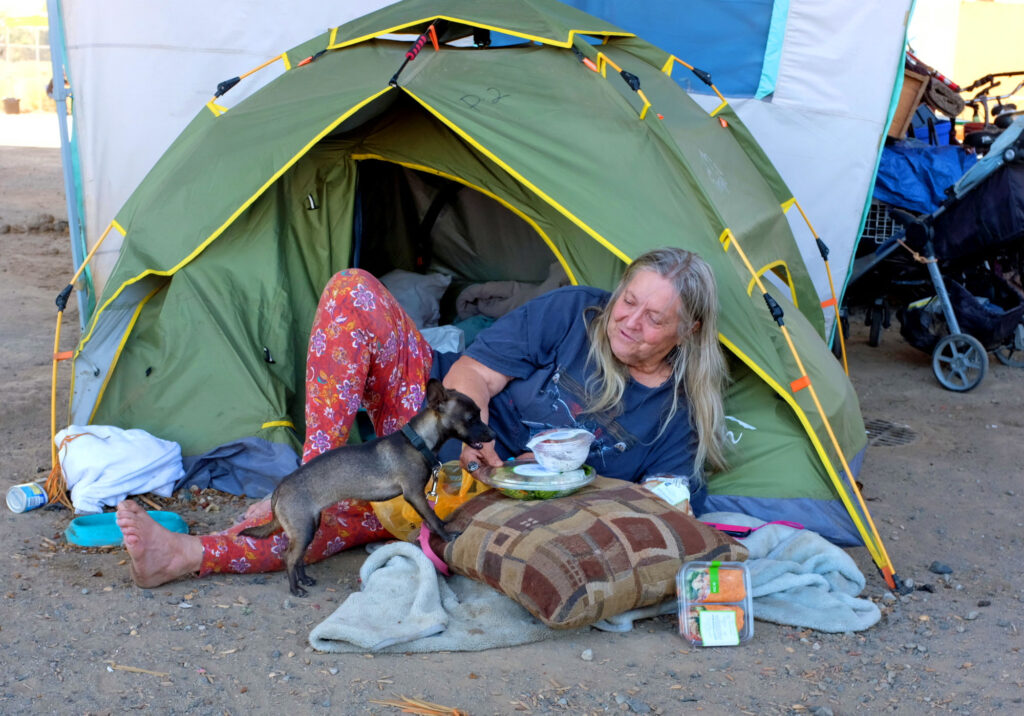Help for homeless people must always be understood within the context of a huge deficit. As we’ve noted in Part I, in every category that might be construed as providing help for homeless people, there’s a severe shortage. There are shortages of housing, shortages of treatment facilities, shortages of personnel, and shortages of political will.
Even so, significant numbers of homeless people refuse help even when it’s available. Though there’s a wide difference among each individual’s reasons for rejecting help, there are enough common pathologies and patterns to enable some generalizing about their motives.
Mental Illness and Anosognosia
No one argues that California has sufficient mental health facilities for the mentally ill homeless population. Nonetheless, there are occasions when help is available. The problem is that mentally ill people, are, by definition, non compos mentis. Since they’re not capable of reasoned judgment, it’s no surprise that mentally ill people often reject help.
Moreover, a significant percentage of the mentally ill also suffer from anosognosia, a condition which prevents them from knowing they are ill. In those cases, mentally ill people see no reason to accept help, which in many cases would involve a stay in a locked down facility.
Trauma
Sleep-deprived, malnourished, hungry, and oftentimes psychically wounded, the chronically homeless are among the most vulnerable people in the nation. Robert Sapolsky, Stanford’s MacArthur Award-winning Professor of Biological Sciences, Neurology and Neurological Sciences, writes that,
“while poverty is bad for your health, poverty amid plenty—inequality—can be worse by just about any measure: infant mortality, overall life expectancy, obesity, murder rates, and more. Health is particularly corroded by your nose constantly being rubbed in what you do not have.”
Homeless people are the poorest of the poor among us. Their daily lives are constant reminders of their low socioeconomic status. The effects are devasting. Sapolsky adds that,
 “Scientists have been able to trace physiological connections from external inequality to three key inner areas: chronic inflammation, chromosomal aging and brain function.”
“Scientists have been able to trace physiological connections from external inequality to three key inner areas: chronic inflammation, chromosomal aging and brain function.”
Extreme poverty in the form of homelessness results in measurable organic damage to homeless people’s bodies and minds. That damage is especially acute for brain function in the pre-frontal cortex (PFC):
“What happens when the PFC is impaired in this way?” asks Sapolsy, then answers his own question:
“Lousy, impulsive decisions happen. Consider ‘temporal discounting’: when choosing between an immediate reward and a bigger one if you wait, the appeal of waiting goes down as the time you have to wait goes up. The PFC is normally good at combating this shortsightedness. But stress steepens temporal discounting; the more cumulative stress, the less PFC activation in experiments that call for gratification postponement. For people sliding further into inequality, the less active PFC makes it harder for the brain to choose long-term health over immediate pleasure. That neurological effect might explain why people with more total life stress gain more weight and smoke and drink more than those with fewer stressors.”
The “bad choices” so often attributed to homeless people are most often due to stress-imposed disabilities, exacerbated by low socioeconomic status.
Dignity
At least since the time of Ralph Waldo Emerson’s famous essay on “Self-reliance” in 1841, independence has been one of the cardinal American virtues. Today, after decades of talk show rants about welfare queens and bums, the stigmata associated with poverty and a need for help are indelible. For those reasons, a great many homeless people will suffer extreme discomfort and want before asking for or accepting help. Asking for or accepting help can be painfully humiliating, especially when people look down on the recipient.
Hobos and Bums
Much of the misinformation about homeless peoples stems from confusion about who they are. Variously described as “vagrants,” “transients,” “hobos” and “bums,” those few members of the homeless population who’ve actually chosen to live outside are part of a long American tradition of rail riders, clever panhandlers, and street artists who for many reasons have chosen to live by their wits and off the grid.

Most towns, even small towns, have had members of this small subset of homeless people. They are the local “characters” and “free spirits” who’ve found homes in backyard tents and behind businesses whose owners tolerate their presence as long as they keep things clean and tidy. As a rule, they don’t do well around people other than their own kind, sometimes due to disorders involving anger or claustrophobia. Sometimes, they form loose associations with others like them, hence the notorious “hobo jungles” of times past.
It is this group, more than any other category of homeless people, that has led to the widespread notion that homeless people don’t want help. Fiercely independent and with the hardy endurance of the old mountain men, these resourceful individuals represent an ongoing demographic of the traditional American cityscape.
Addiction
If drug use caused homelessness, homelessness would be highest in the states with the highest per capita drug use. That’s not the case. However, because of a severe deficit of drug treatment programs, addiction can be a factor in keeping people on the streets.
Even in those cases when homeless addicts can get into a program, they’re almost always still homeless when they get out. In fact, many chronically homeless people have been through programs several times. Unfortunately, once they hit the streets again, staying off drugs becomes nearly impossible.
Since congregate shelters are usually the only option other than the streets, addicts are faced with the nearly impossible task of getting off drugs without professional help if they want to enter a shelter where drugs are prohibited.
Imagine if Rush Limbaugh, Robert Downey Jr., or any other celebrity addict were told, “Before you can enter our program, you have to be drug free.” It’s a ridiculous proposition. Nonetheless, that’s the situation with many homeless addicts. They can’t use drugs while in a shelter, and a shelter is the only option they have while waiting to enter a treatment program.
Help? Define Help
Despite a plethora of reasons for rejecting help in the form of an offer to visit a congregate shelter, most any homeless person most anytime will accept the offer of a motel room or a safe place to sleep, even if on the hard ground. The failure of wealthy states in a wealthy nation to provide such help is stark evidence that a lack of political will has been a major factor in the refusal to manage homelessness other than by means of sweeps and jail time. It is one of the major institutional failures of our time.
Next: Why Homeless People don’t Want Help Part III: The Long and Winding Dead End

Considering they don’t want help, Claude takes a deeper dive and says:
When someone says “they don’t want help,” there are often deeper meanings or underlying issues at play. Here are some possibilities for what a person might really be communicating:
Fear of vulnerability: Accepting help can make people feel exposed or weak.
Pride or desire for independence: They may want to prove they can handle things on their own.
Past negative experiences: Previous unhelpful or harmful “assistance” may make them wary.
Lack of trust: They might not trust others’ motives or abilities.
Feeling undeserving: Low self-esteem can make people feel they don’t merit assistance.
Overwhelmed or in denial: They may not be ready to face their problems.
Different perception of the situation: They might not see their circumstances as requiring help.
Avoidance of obligation: Concern about owing favors or feeling indebted to others.
Protection of privacy: Fear of exposing personal issues or information.
Miscommunication: They may want a different kind of help than what’s being offered.
Need for control: Accepting help might feel like losing control of their situation.
The specific meaning can vary greatly depending on the individual and context. Often, a gentle, non-judgmental conversation can reveal the true reasons behind their reluctance to accept help.
Great contribution to help folks navigate the conversation with others, and their own internal dialogue.
Thinking about Homeless means thinking about the fixes. Churches are bound strictly by what they, money and volunteers have and by the municipality they live in. Non profits the same but there are too few I think. No one reallY WANTS to be in charge all the way along the whole never ending process of managing homelessness. Usually Insurance rears its ugly, expensive head and then there is the problem of location, monitoring for safety and enforcing rules so that all benefit. Then add health, food, and sleeping quarters just for starters. Some have to be convinced to participate, some might be violent, some disabled and some might even be eager to get help. Lots of “It Depends”, including education, training, and jobs when possible. They can’t all be together for long periods as some will hold others back and could be dangerous. In my mind it comes down to a government entity, at EVERY LEVEL, USA, STATES, COUNTIES , CITIES AND RURAL LOCATIONS to be in charge of the whole business. Size of each Dept. DEPENDS ON size of the problem and population. Government has the most leverage, knowledge, resources to do the job. Government would be their own insurance as no for profit can be enticed at an affordable cost. The cost of doing this can’t COME FROM A LOCAL GENERAL FUND as that would be bankruptcy. That’s why it has to be in all levels of Gov. and an agency unto itself but accountable and audited for honesty and effectiveness. It’s a national problem and must be treated as such. The other way is like throwing darts at a board and wringing your hands. My inability to see any other way is why I’m writing. Accountability must be taken by those most able to fix it.’
Cruel and unusual punishment.. to punish someone for being at a low in life is another reason. Being made to feel like a criminal for survival is…… But I am living this snd my heart is saddened because I see the pain in the hearts of homeless I have been inflicted by the pain as well. We just want to be treated like people not like something they are trying to exterminate.